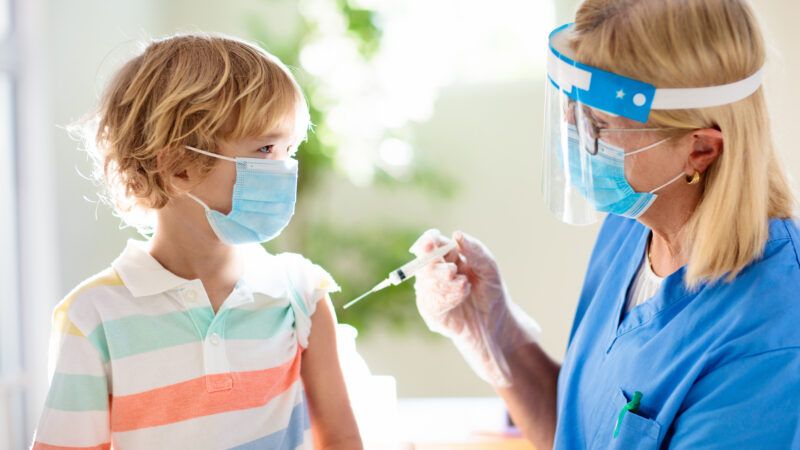Adding the COVID-19 Vaccine to the Childhood Immunization Schedule Is a Mistake
Blue states may require the vaccine after the CDC recommends it, stripping families of a choice that should be theirs.

The Centers for Disease Control and Prevention (CDC) are likely to add the COVID-19 vaccine to the immunization schedule for children and adolescents. Last week, an advisory panel voted unanimously to recommend the COVID-19 vaccines for all Americans ages 6 months and older, and the full agency is almost certain to sign off on this decision.
Such a move would not automatically make the vaccines mandatory for children: In theory, CDC guidance is optional. But in practice, many municipalities will be inclined to require whatever the CDC recommends. During the pandemic, cities and states controlled by Democratic political figures frequently rubber-stamped federal health officials' extremely cautious coronavirus recommendations relating to masks, social distancing, and lockdowns. Blue municipalities took their cues from their local health departments, which in turn copied the CDC's guidance wholesale into formal policy. When frustrated, caution-weary constituents would ask their local officials about timelines for getting rid of mask mandates and reopening schools, their answer was usually something like, "When the CDC says so."
This means that adding the COVID-19 vaccine to the childhood immunization schedule will create a tremendous incentive for blue states to require it for public school children. This would be a profound mistake.
In general, the rationale for vaccine mandates is public health: Public school children are required to get vaccinated for measles, for instance, in order to prevent the spread of measles to other, more vulnerable individuals. This same logic does not hold for the COVID-19 vaccines, which have largely failed to prevent the spread of infection, particularly for the COVID-19 variants. The vaccines do a tremendous job of preventing elderly and at-risk people from suffering severe illness and dying, but most children are spared the worst effects of COVID-19, anyway—particularly if they were already infected, which is the case for nearly nine out of every 10 kids, according to the CDC.
Some European countries have looked at the data and determined that there isn't enough net benefit to merit childhood vaccination. Denmark, for instance, is no longer recommending COVID-19 vaccines for otherwise healthy young people under the age of 18. This is not because Denmark's government was overtaken by anti-vaxers, but rather because there are reasonable arguments both for and against the policy. Thus, leaving the matter to individual families and their doctors is wise. Indeed, even in the U.S., less than 40 percent of kids under the age of 11 have received the vaccine. Most parents have evidently decided that this course of action is not strictly necessary for their children, and there is nothing wrong with that.
Requiring children to get the COVID-19 vaccine could, on the other hand, create several problems. Parents who are disinclined to give their children the COVID-19 vaccine might start to wonder whether the other vaccines on the childhood immunization schedule are similarly unnecessary—which could have dire results for public health. Unvaccinated children might simply end up dropping out of school, which would worsen the pandemic-driven crisis of learning loss. Low-income students and students of color will be hardest hit; attempts by Washington, D.C., to require public school children to get jabbed were delayed after it became clear that a disproportionate number of unvaccinated black and brown young people would be banned from school under such a policy.
"If mandates become the norm, unvaccinated children will be displaced to virtual school, home school, or perhaps no school at all," writes Vinay Prasad, a health researcher and professor of epidemiology at the University of California, San Francisco. "The harm to kids from substandard education—after nearly two years of disruption—far exceeds any gains from compliance."
Some states have already signaled that they will not require the COVID-19 vaccine of school children, even if the CDC schedules it. Given the reality of COVID-19—most children already have some protection from it, and getting vaccinated does not substantially prevent outbreaks of it—this is the right move.
Let individual families talk to their doctors about vaccinating their children and make this decision on a case-by-case basis. The government does not have a legitimate rationale for butting in.


Show Comments (94)